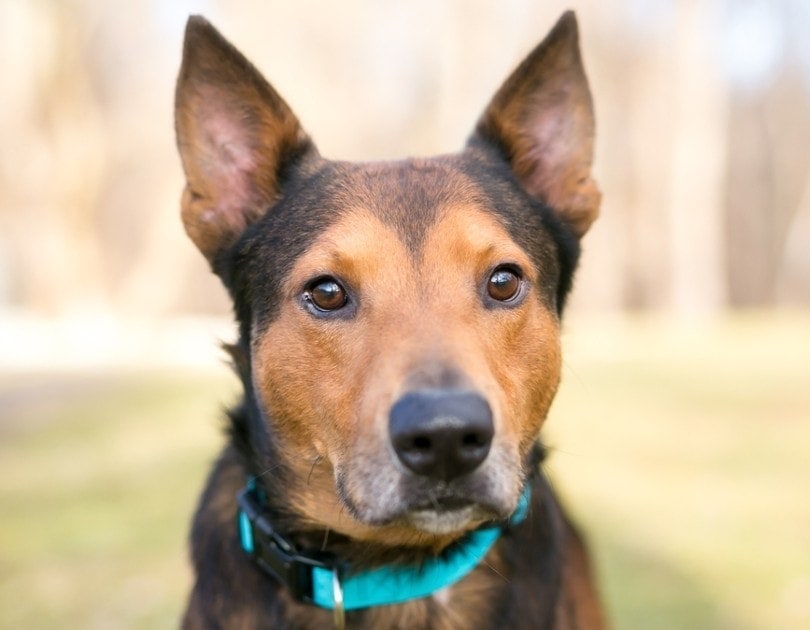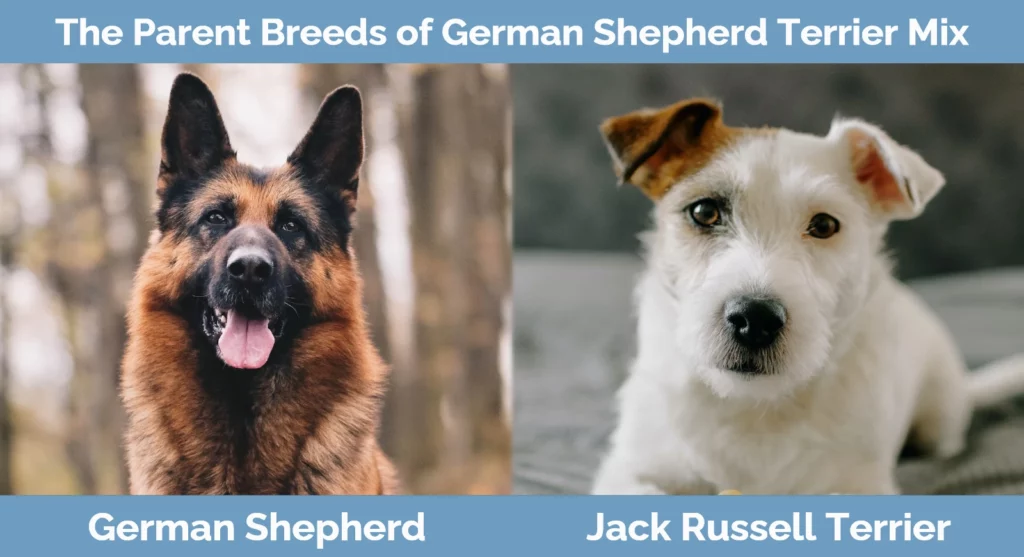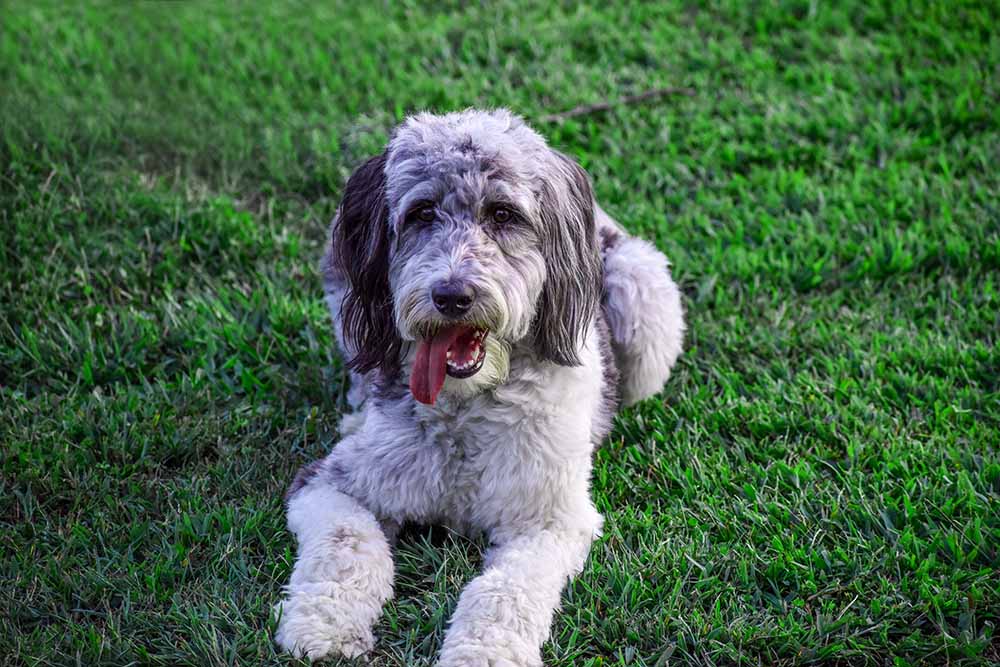German Shepherd Terrier Mix Info: Pictures, Temperament & Traits
Updated on

| Height: | Varies |
| Weight: | Varies |
| Lifespan: | 9 – 14 years |
| Colors: | Any |
| Suitable for: | Active families looking for protective dogs |
| Temperament: | Energetic, protective, devoted |
German Shepherd Terrier mixes are often friendlier, more energetic versions of the purebred German Shepherd. They’re also a bit smaller since most Terriers are significantly smaller than the German Shepherd. However, when you’re mixing two breeds together, you’ll never know what you’re going to get!
Furthermore, the term “terrier” is a bit vague. It applies to a group of dogs, not a specific breed. A Bull Terrier will create a much different dog than the Jack Russell Terrier, for instance. With that said, these dogs have traits that they share. For instance, they are extremely energetic. You shouldn’t adopt this breed unless you’re willing to put in a lot of exercise time. They’re perfect for active families, but you shouldn’t expect them to spend much time cuddling.
Due to their potential protective instincts, we only recommend German Shepherd Terrier mixes for experienced dog owners. They can be quite territorial. It takes a decent amount of training and socialization to keep the dogs under control and help them develop into friendly, well-behaved dogs.
German Shepherd Terrier Mix Puppies
In many cases, these dogs are not available from breeders. Some mixed breeds are popular enough to have breeders dedicated to them, but the German Shepherd Terrier is not one of them. For the most part, you won’t find breeders producing these canines regularly. Most dogs will come from accidental litters. A German Shepherd will accidentally end up breeding with a terrier, leaving the owner with a bunch of puppies to get rid of.
As you might imagine, the puppies will often be extremely inexpensive. You may even be able to get them for free. However, they would not have undergone the genetic testing that breeders put their dogs through. You also can’t assume that the puppy has no underlying health conditions, as they often don’t receive the proper health care.
Some backyard breeders produce this mixed breed, and they may be a better option than purchasing a puppy from an accidental litter. However, the quality of these puppies tends to shift a lot. Some are genetically tested and receive vet care, and others don’t. Be sure to ask about the breeder’s policies, especially if they are new!
 3 Little Known Facts About the German Shepherd Terrier Mix
3 Little Known Facts About the German Shepherd Terrier Mix
1. These Dogs Are Rare
It is often very difficult to find German Shepherd Terrier mixes. This mixed breed is not popular, so they often aren’t produced in significant numbers. There are few terriers that a German Shepherd can breed with, making accidental litters a bit difficult as well.
2. “Terrier” Doesn’t Tell Us Much
There are many kinds of terriers. Jack Russel Terriers are small, energetic dogs bred to hunt small rodents and protect farmland from pests. The American Staffordshire Terrier is a larger dog that was bred to fight other animals. They are largely kept as companion animals today, though they are also one of the few dog breeds that can handle wild boars and similar, dangerous animals.
We recommend asking about the specific terrier used to produce the puppy before adopting them. The breed can affect their temperament significantly. However, finding this information isn’t always possible. In accidental litters, the identity of one parent may not be known. Many rescues and animal shelters guess on a dog’s breed, which isn’t always accurate.
3. Their Size Varies Tremendously
It’s challenging to predict how large a German Shepherd Terrier will grow. Some terriers are pretty large, which would produce a dog closer to the size of a German Shepherd. However, if you’re breeding a German Shepherd with a smaller dog, there is no telling what size dog you will end up with! They may weigh as little as 20 pounds or as much as 60 pounds. Don’t adopt this breed if you’re looking for a specific-sized dog.

Temperament & Intelligence of the German Shepherd Terrier Mix 🧠
The personality of this breed varies widely. Often, they are at least somewhat protective. Sometimes, they can be extremely protective, while this trait is less pronounced in other instances. Where their protective instincts fall depends on the genetics they inherit from both parents, as well as how they were raised. Dogs that are heavily socialized at a young age can often be friendly (or at least not aggressive) towards strangers.
This canine will likely never be as friendly as a Labrador Retriever. But they can be socialized to prevent aggression towards people they don’t know. A quality German Shepherd Terrier mix shouldn’t be aggressive, though they aren’t going to try and cuddle with everyone who walks in the door, either.
Often, this breed is exceedingly intelligent. This makes them very easy to train. They are often very devoted to their owners and follow commands easily. However, it also means that they need regular mental stimulation to stay happy and healthy. Otherwise, they can become bored and destructive.
With that said, most terriers are not as intelligent or trainable as a German Shepherd. Therefore, this mixed breed probably won’t be either. They are still intelligent dogs. Just don’t expect them to perform on par with a purebred German Shepherd.
This mix may be more prone to destructive behaviors than other breeds because they’re needier than most. They require lots of mental stimulation and exercise. If these needs aren’t met, they can become wild and unruly. However, as long as you can meet their needs, these dogs are an excellent option for most experienced dog owners. Just be sure you can dedicate the time their temperament calls for before you adopt a puppy.
Are These Dogs Good for Families? 🏡
Often, these dogs are large enough to avoid being injured by children, which increases the chance that they’ll get along with children substantially. Most are not scared of kids due to their larger size, especially if they have been socialized with children previously. However, sometimes, German Shepherd Terrier mixes can be pretty small. They aren’t going to be tiny like some other breeds, but some dogs may not grow to be bigger than 20 pounds.
This weight is plenty small enough for some exuberant children to hurt. If a 20-pound child falls on a 20-pound dog, the dog could easily get hurt. Often, these dogs are great with members of their own family, including children. However, they can be protective against kids that they don’t know. Be sure to keep this in mind if your child regularly has other kids over. The dog might not like them playing together very much, especially if things get a bit rough.
In the end, it can be hit-or-miss with this mixed breed and smaller children. However, they are often great for active families with older kids. If you have small children, you may want to look elsewhere for a more appropriate breed. If you adopt these dogs as adults and know that they are on the larger end of the spectrum, they can be good in households with small children.
Does This Breed Get Along with Other Pets? 🐶 😽
This breed can get along with other dogs when socialized properly. Their protective instincts can be applied to unfamiliar dogs, especially if they come into their home. However, most are completely fine with dogs they have been raised with. They’re part of the family, after all!
However, it takes socialization to make your German Shepherd Terrier mix accept other dogs. We highly recommend puppy classes at an early age. Group classes are great for training and socialization. In fact, we recommend them primarily because they provide a great socialization opportunity that is safe and controlled.
Due to their strong prey drive, we can’t recommend this breed for homes with cats and other small pets. They simply aren’t suitable for those environments! They will chase cats and anything else that they interpret as prey animals. Because this is an innate instinct and not fear-driven, socialization will not help you. It doesn’t matter how many times you show your German Shepherd Terrier a cat. They will still see it as something to chase.
Things to Know When Owning a German Shepherd Terrier Mix:
Food & Diet Requirements 🦴
For the most part, German Shepherd Terriers need the same macronutrients that other dogs need. You should aim for a diet high in protein and fat, especially given the active nature of this breed. These nutrients are required to maintain their lean muscle mass. More active dogs may require a high-protein diet. Dog food with more protein is often more expensive since it contains more meat. However, it may be necessary to keep an active dog in tip-top shape.
When they are puppies, feeding these canines can be a bit complicated. They often aren’t large enough to fall into the “large breed” category. Therefore, we don’t recommend feeding them food specifically for a large-breed puppy. However, we do recommend choosing a very high-quality puppy food. These dogs are prone to hip dysplasia, which develops when they are puppies and has a dietary component.
You don’t want your dog to develop this condition. High-quality dog food may be essential to preventing it and supporting healthy hip growth. Keep feeding your dog puppy food until they stop growing, which may take a year or longer. Because the dogs grow at different rates, your best option is to keep an eye on their growth. There is no way to know precisely when a particular dog will stop growing.
Exercise 🐕
German Shepherd Terrier mixes are very energetic. They will need walks daily, often as many as two or three. If you aren’t home during the day, you should expect to hire a dog walker. Often, they cannot go 8 hours without some form of exercise. A fenced-in backyard is helpful for this breed. However, it is not required. If you can provide other sorts of exercise, there is no reason to invest in a fenced-in yard.
With that said, even if you do have a fenced-in backyard, you can’t expect your dog to exercise themselves just because you let them outside. Putting your dog outside in a backyard does not qualify as exercise. They need something that encourages them to exercise, or it doesn’t count. German Shepherd Terriers enjoy just about anything active. These activities include your usual dog walks, jogging, hiking, and swimming.
They make great dogs for families that are always on the go. If you’re looking for a canine that can keep up with your high activity level, this option is the best. However, they are unsuitable for families that tend to stay around the house all day. These dogs need activity, or they will become destructive and overbearing. Much of their destructive behavior derives from not being exercised enough.
Training 🦮
Training is necessary to keep them mentally stimulated and behaved. An untrained German Shepherd Terrier mix can be downright dangerous in some situations. They often feel very protective of their family, but that doesn’t necessarily mean they’ll understand what to protect their family against. Without proper socialization and training, these canines can become protective against all people and other dogs they don’t know. When you have visitors over, they may not accept their presence at all.
With that said, German Shepherd Terriers are usually pretty easy to train. They are not as devoted or concentrated as a purebred German Shepherd but are more focused than other breeds during training. We recommend training them early and often. Start with basic commands, but be sure to practice them in various places. Often, dogs perform perfectly fine until they are asked to perform a common task somewhere with distractions – like on a walk in the park.
However, these are the exact times when you really need your dog to listen! When you finish the basics, feel free to move on to more advanced commands. Your main concern will be finding new things to teach these dogs at some point!
While training is important for controlling German Shepherd Terriers, it is also essential for mental stimulation. They can become destructive if you don’t provide ways to exercise their minds. Because these dogs are incredibly intelligent, they require more mental stimulation than other breeds. Training is one of the best ways to achieve this stimulation. You’re taking care of two things at once!
Grooming ✂️
Usually, these dogs are very low-maintenance when it comes to grooming. Their coat does a good job of taking care of itself. However, we recommend brushing them at least weekly. German Shepherd Terriers shed quite a bit, and this weekly routine will help limit the amount of hair around your house.
Brushing is also important to keep their coat clean. It removes the dirt and dust that has built up over the week, effectively preventing them from needing a bath. Brushing also spreads around the natural oils in their coat, which promotes healthy skin and keeps their coat even cleaner.
German Shepherd Terrier mixes do not need trimming. They will likely have a double coat. If you trim a double-coated dog, it can mess with their ability to regulate their body temperature. Therefore, we don’t recommend trimming them down at all. It can make a fluffy dog hotter in the summer, not cooler.
Of course, you will need to trim their nails as necessary. They will continue to grow until they are cut. Overgrown nails can be painful and are more prone to injury. They can split and become caught on environmental hazards, like blankets and carpets. You may need to trim inside their ears and on the bottom of their feet. The hair in these areas is unnecessary and can cause problems. For instance, hairy ears can trap debris and moisture, causing ear infections.
Brush their teeth at least a few times a week. Every day is often better, but we understand that not every dog owner is up to this task. Brushing is essential for preventing periodontal disease – which can lead to serious (and expensive) health problems.
Health and Conditions ❤️
Like all breeds, the German Shepherd Terrier is prone to a few different health problems.
- Hip Dysplasia: This condition occurs when the dog’s hips don’t develop correctly, leading to the ball and socket not lining up. Over time, this leads to arthritis-like symptoms. Sometimes, surgery is required. However, this condition is often treatable through pain medication and supportive therapy.
- Heart Disease: This breed may be affected by various heart diseases. Dilute cardiomyopathy is one of the most common heart problems. Typically, dogs diagnosed with heart conditions are not curable, but their condition may be slowed through the correct medication.
- Bloat: If your mix is larger in size, they may develop bloat. This illness is characterized by the stomach filling with gas and becoming bloated to the extreme. Usually, bloat strikes quickly and can cause death within a matter of hours. The stomach gets so big that it cuts off circulation to surrounding tissue, causing necrosis and shock.
Male vs. Female
There isn’t a significant difference between male and female German Shepherd Terriers. The sizing differences of the German Shepherd disappear when mixed with other breeds. The breed’s size difference is largely based on genetics at that point – not gender. You’ll find some very large females and very small males.
So, gender differences are nearly impossible to predict. There aren’t significant temperament differences, either. Males are not more likely to be more territorial. Temperament variances between dogs will mostly be based on the genetics they inherit, as well as their socialization and training.
Conclusion
The German Shepherd Terrier is an extremely energetic dog. They are bound to have protective instincts, though the exact amount can vary widely from dog to dog. They require significant training, socialization, and exercise. They are not low-maintenance dogs by any means. You can’t leave them home alone for much of the day and expect them to thrive!
Therefore, we only recommend these dogs for experienced owners with plenty of time on their hands. It also helps if you’re a bit more energetic. They require extensive exercise, which can be difficult for the average owner to fulfill.
Related Reads:
Featured Photo Credit: Mary Swift, Shutterstock














